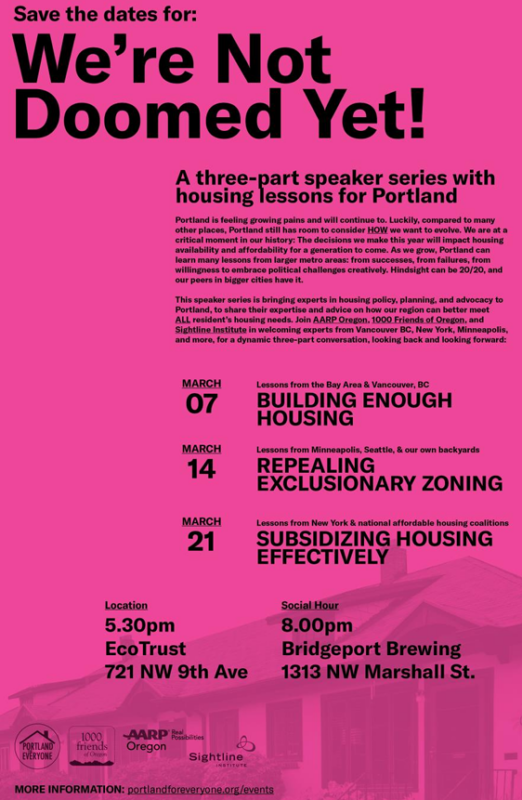
By Heather Beck, Julian St. Patrick Clayton, Rachel Goodfriend, Lauren Stander, Catherine Vaughan, Nicole Vlado, Pablo Zevallos
New York City’s need for more housing is undeniable. We have the ability to build more housing, but we are challenged by a lack of buy-in and a long-term vision for how to build. Our political system has failed to respond to the housing crisis not due to a lack of broad buy-in, but due to structural flaws that prioritize the few over the many and incentivize private interests over public good.
Lessons from Oregon, New Zealand, and New Jersey
Coalition-Building: Oregon
In the 2010s, Portland, Oregon explored zoning reforms to legalize construction of multifamily buildings on lots zoned exclusively for single-family homes. The Portland for Everyone (P4E) campaign – comprised of a coalition of community organizations, individuals, and local businesses – advocated for land use policies promoting affordable housing options citywide. The campaign was instrumental in pushing Portland to enact its first-ever comprehensive plan in 2016. To scale its impact, advocates organized local chapters across the state. A coalition of diverse stakeholders, including the AARP, was instrumental in passing 2019 legislation to legalize duplexes and fourplexes in smaller cities. Combined with an increased focus on racial justice in the summer of 2020, the coalition seized political opportunities to push for even more ambitious reform in Portland.
Structural Change and Policy Feedback Loops: New Zealand
In 2010, Auckland’s seven municipal councils amalgamated into a single authority, which created the “Auckland Plan” to set housing and sustainability goals. In 2016, Auckland upzoned 75% of its residential land area, resulting in a 15% increase in housing stock over the next eight years. Nationwide upzoning was introduced to stimulate economic growth. Advocates argued that densification of New Zealand cities would protect agricultural zones and other natural areas from sprawl. This framing was critical in generating support from a youth-led environmental coalition, who embraced upzoning as a climate justice issue and helped push reform across New Zealand.
Landmark Cases and the Use of Courts: Mount Laurel, New Jersey
Although relatively insulated from politics, courts often align with and influence public opinion. The Mount Laurel doctrine – two decisions made by the New Jersey Supreme Court in 1975 and 1983 – mandated the construction of income-restricted housing, banned exclusionary zoning, and required municipalities in New Jersey to permit their “fair share” of income-restricted affordable housing. The 1985 Fair Housing Act (FHA), which the New Jersey State Legislature enacted at the behest of the Court, more fully implemented these rulings. Despite setbacks, the Mount Laurel Doctrine has been upheld and represents one of the most progressive housing laws in the U.S., demonstrating that courts can generate popular support for controversial issues.

▲ Happy Hour Flyer, 2018 (Image credit: Sightline Institute)
Big Swings for New York City
- Enact housing policy that drives buy-in. This requires transforming decision-making structures that privilege a small (but loud) set of voices opposed to housing development by reforming community boards, ending councilmember deference, and leveraging courts to protect and enforce New Yorkers’ right to affordable housing.
- Use evidence to create a shared vision for the city’s future and deny opportunities for misinformation.
- Connect messaging around housing production to other regional policy goals, including equity, economic, and climate goals.
- Engage residents and stakeholders to support the impact of messaging and adapt policies to address pain points experienced during implementation.
- Recognize the potential negative impact that previous zoning and policy changes have had on under-represented residents and address these both in policy making and messaging.
Fellows

Heather Beck

Julian St. Patrick Clayton

Rachel Goodfriend

Lauren Stander

Catherine Vaughan

Nicole Vlado Torres
